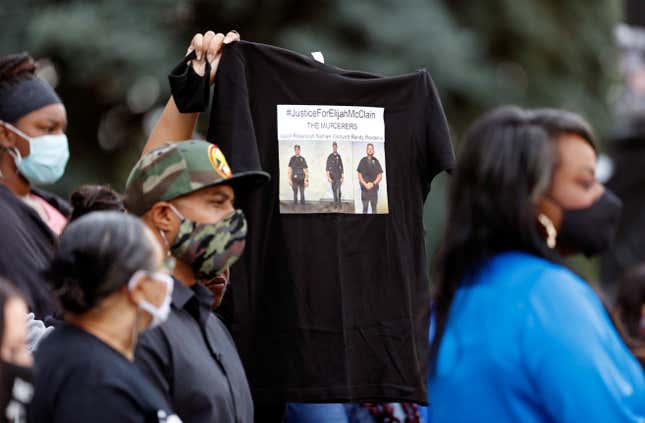
When 23-year-old Elijah McClain died after police put him in a chokehold last year, the news of his killing—and the subsequent decision to not press criminal charges against the Aurora, Colo., officers who apprehended him—didn’t reach far beyond the state.
But, in the wake of the extrajudicial killing of George Floyd in Minneapolis last month, the Black Lives Matter protests of recent weeks have drawn new attention to a number of state-sponsored killings, including McClain’s case. Spurred by a nationwide outcry over McClain’s death, Colorado Gov. Jared Polis announced his administration will take a fresh look at the case, reports CNN.
Polis explained his decision in a series of tweets posted on Wednesday.
“Public confidence in our law enforcement process is incredibly important now more than ever. A fair and objective process free from real or perceived bias for investigating officer-involved killings is critical,” Polis wrote. “I am hearing from many Coloradans who have expressed concerns with the investigation of Elijah McClain’s death. As a result, I have instructed my legal council to examine what the state can do and we are assessing next steps.”
Polis’ decision comes after more than 2 million people signed a petition urging government officials to reopen McClain’s case, reports BuzzFeed.
Three Aurora police officers confronted McClain as he walked from a grocery store to his home at around 10:30 pm on Aug. 24, 2019. What happened next can only be described as harrowing, cruel, and unnecessary. From BuzzFeed:
According to the department’s incident report, an unknown individual called 911 because McClain was wearing a ski mask and “acting weird” by “waving his arms around.”
His sister, Naomi McClain, told Denver7 in September that her brother was trying to purchase bottled tea for a cousin and was wearing the mask because “he had anemia and would sometimes get cold.”
The officers stopped McClain, told him he was “being suspicious,” and attempted to pat him down.
Per audio from body camera footage, as McClain frantically asked police to let him go, one of the three officers accused him of reaching for another officer’s gun.
One of the officers then placed McClain in a carotid hold, or chokehold, a move in which pressure is applied to the neck, restricting blood flow to the brain.
McClain passed out in the hold, prompting the officers to call for medical assistance. Paramedics arrived on the scene and injected McClain with ketamine to sedate him.
Like so many other victims of state violence, McClain begged for his life as he struggled against the three officers. In audio from the cops’ body cameras, McClain can be heard telling officers he can’t breathe, at one point, vomiting while he was held in the chokehold.
“I have no gun. I don’t do that stuff,” McClain said. “I don’t do any fighting. Why are you attacking me? I don’t even kill flies.”
McClain was taken to a hospital after the arrest and suffered a heart attack in the ambulance. He was declared brain dead three days later.
According to CNN, an autopsy did not determine the cause of McClain’s death, “but listed intense physical exertion and a narrow left coronary artery as contributing factors.”
The three Aurora Police officers involved in McClain’s death, Nathan Woodyard, Jason Rosenblatt, and Randy Roedema, were placed on administrative leave in the immediate aftermath of the incident. However, as BuzzFeed reports, they were reinstated to the police force once District Attorney Dave Young declined to press charges against them.
But the renewed interest in McClain’s death, while necessary, also highlights discrepancies in which cases of systemic and state violence receive nationwide attention, and which don’t. On social media, many shared moving details of McClain’s life: how he would play the violin to stray cats to calm them so they wouldn’t feel lonely; how he begged the police to recognize that he was an introvert—“I’m just different,” he told police, “You are beautiful and I love you.”
These details tell us more about who McClain was—gentle and openhearted—but they also reinforce something deeply uncomfortable: the recognition that without these details about his life, it’s hard to envision McClain’s death getting the attention it has gotten. This is further emphasized by the parallels between his death and Floyd’s in May—two men, one young, the other a middle-aged father, suffering prolonged, cruel deaths at the hands of state forces; two men, among many, pleading that they can’t breathe. If they weren’t so similar, would McClain’s case have resonated so strongly a year later?
Millions have rightfully mobilized around McClain. But it’s impossible to think of him, of all the things that had to happen between his death and now, without thinking of all the others like McClain; all the other Black men, women, and children—sacred, beloved, and gone—who we will never know.

